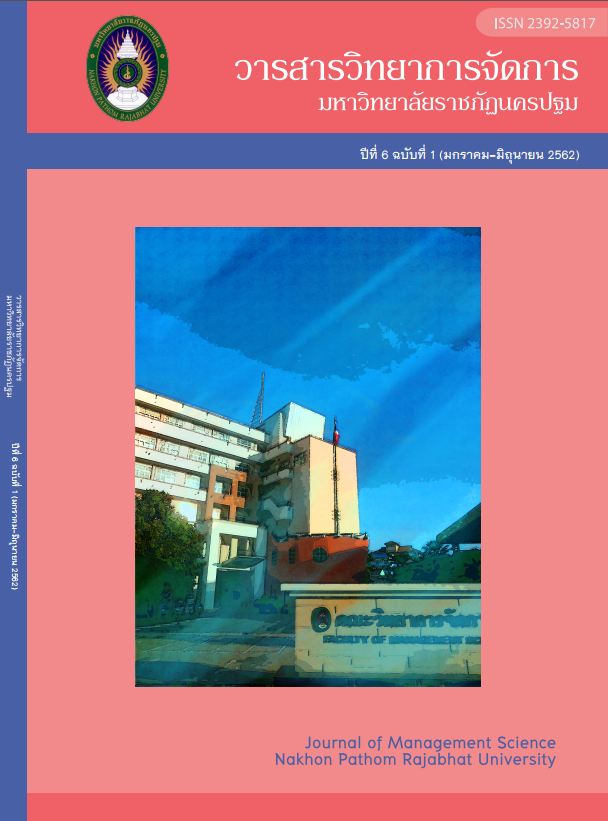Perceived Organizational Support and Employee Job Performance .
Main Article Content
Abstract
Perceived organizational support of employees can influence employee behaviour in various ways. In case of the employees who perceived the organisational supports in the high level, they will behave themselves in a way that they are willing to work for the organization in order to achieve the organization goal, commitment and engagement. This behaviour can positively result in employee performance. In contrast, if the employees perceive the supports from the organization in the low level, mismatching the expectation, it can result in employee performance. Therefore, the perceived organizational support is crucial for developing human resources because employee is accounted as the heart in driving the organization and crating the competitive advantages. The organization, which can be successful or failure, depends on employees in the organization. As aforementioned, this article emphasizes on creating the understanding of executives towards the advantages of establishing perceived organizational supports which it can lead to employee commitment, employee citizenship and employee performance.
Article history : Received 8 January 2019
Revised 6 February 2019
Accepted 11 February 2019
SIMILARITY INDEX = 0.00
Article Details
The views and opinions of the article appearing in this journal are those of the author. It is not considered a view and responsibility of the editorial staff.
References
บุญฑวรรณ วิงวอน และมนตรี พิริยะกุล. (2553). ตัวแบบเส้นทางกำลังสองน้อยที่สุดบางส่วนของบุพปัจจัยและผลลัพธ์ของการรับรู้ในการสนับสนุนจากองค์กรของพนักงานวิสาหกิจขนาดกลางและขนาดย่อม จังหวัดลําปาง. วารสารสมาคมนักวิจัย, 15 (2), 93-108.
ประเวช ชุ่มเกษรกูลกิจ. (2553). การรับรู้การสนับสนุนจากองค์การ ความผูกพันในงาน การเพิ่มคุณค่าระหว่างงานกับครอบครัวและความสุขเชิงอัตวิสัยของพนักงานรัฐวิสาหกิจแห่งหนึ่ง. วารสารวิชาการศิลปศาสตร์ประยุกต์, 3 (2), 20-27.
ปริญดา วิรานุวัตร. (2550). ผลของภาวะผู้นำและการรับรู้การสนับสนุนจากองค์การที่มีต่อผลการปฏิบัติงานของทีมเรือในกิจการเดินเรือ : กลไกการทำงานที่มีความผูกพันด้านจิตใจเป็นตัวแปรสื่อ. วิทยานิพนธ์ ศิลปศาสตรมหาบัณฑิต สาขาวิชาจิตวิทยาอุตสาหกรรมและองค์การ มหาวิทยาลัยธรรมศาสตร์
ศรัณย์ พิมพ์ทอง. (2557). ปัจจัยเชิงสาเหตุที่มีอิทธิพลต่อการคงอยู่ในองค์การของพนักงานมหาวิทยาลัยสายวิชาการในประเทศไทย.
วารสารบริหารธุรกิจ 37 (142), 16-28.
ศศินันท์ ทิพย์โอสถ. (2556). การรับรู้การสนับสนุนจากองค์การของพนักงานที่มีผลต่อการปฏิบัติงานในภาคธุรกิจธนาคาร. วิทยานิพนธ์ บริหารธุรกิจมหาบัณฑิต มหาวิทยาลัยเทคโนโลยีราชมงคลธัญบุรี.
สถาบันเพิ่มผลผลิตแห่งชาติ. (2558). องค์กรในฝันของพนักงาน. [ออนไลน์] ค้นเมื่อ 26 ตุลาคม 2561 จาก https://www.ftpi.or.th/2015/245
สุมินทร เบ้าธรรม. (2554). การรับรู้ถึงการได้รับการสนับสนุนจากองค์กร ความพึงพอใจในการทำงาน ความผูกพันต่อองค์กร และความตั้งใจที่จะลาออกจากงานโดยสมัครใจของบุคลากรในสังกัดมหาวิทยาลัยเทคโนโลยีราชมงคลอีสาน และมหาวิทยาลัยเทคโนโลยีราชมงคงธัญบุรี. วารสาร มทร.อีสาน 4 (1), 37-55.
อภิลักษณ์ ธรรมวิมุตติ และ ธีระวัฒน์ จันทึก. (2560). ทุนมนุษย์เชิงนวัตกรรมและสร้างสรรค์ของผู้ประกอบการ วิสาหกิจชุมชน. Veridian E-Journal Silpakorn University ฉบับภาษาไทย สาขามนุษยศาสตร์สังคมศาสตร์ และศิลปะ, 10 (1), 1572-1589
อัมพิกา สุนทรภักดี. (2559). การรับรู้การสนับสนุนจากองค์การ การรับรู้ความสามารถของตนเองด้านอาชีพ และผลการปฏิบัติงานของพนักงานขายในธุรกิจประเภทอาหารและเครื่องดื่มแห่งหนึ่ง โดยมีการยึดมั่นต่อเป้าหมายเป็นตัวแปรสื่อ. วิทยานิพนธ์ศิลปศาสตรมหาบัณฑิต .จิตวิทยาอุตสาหกรรมและองค์การ. มหาวิทยาลัยธรรมศาสตร์.
Bakker, A. B., & Demerouti, E . (2008). Towards a model of work engagement. Career Development International, 13 (3), 209-223. doi:10.1108/13620430810870476
Chiang, C.-F., & Hsieh, T.-S. (2012). The impacts of perceived organizational support and psychological empowerment on job performance: The mediating effects of organizational citizenship behavior. International Journal of Hospitality Management, 31 (1), 180-190. doi:https://doi.org/10.1016/j.ijhm.2011.04.011
Collins, J. C. (2001). Good to great: Why some companies make the leap and others don't. New York, NY: HarperBusiness.
Coyle-Shapiro, J. A-M., & Conway, N. (2005). Exchange Relationships: Examining Psychological Contracts and Perceived Organizational Support. Journal of Applied Psychology, 90 (4), 774-781. doi:https://dx.doi.org/10.1037/0021-9010.90.4.774
Eder, P., & Eisenberger, R. (2008). Perceived organizational support: Reducing the negative influence of coworker withdrawal behavior. Journal of Management, 34 (1), 55-68. doi:https://dx.doi.org/10.1177/0149206307309259
Eisenberger, R., Cummings, J., Armeli, S., & Lynch, P. (1997). Perceived organizational support, discretionary treatment, and job satisfaction. Journal of Applied Psychology, 82(5), 812-820. doi:https://dx.doi.org/10.1037/0021-9010.82.5.812
Eisenberger, R., Fasolo, P., & Davis-LaMastro, V. (1990). Perceived organizational support and employee diligence, commitment, and innovation. Journal of Applied Psychology, 75 (1), 51-59. doi:https://dx.doi.org/10.1037/0021-9010.75.1.51
Eisenberger, R., Armeli, S., Rexwinkel, B., Lynch, P. D., & Rhoades, L. (2001). Reciprocation of perceived organizational support. Journal of Applied Psychology, 86 (1), 42-51. doi:https://dx.doi.org/10.1037/0021-9010.86.1.42
Eisenberger, R., Stinglhamber, F., Vandenberghe, C., Sucharski, I. L., & Rhoades, L. (2002). Perceived supervisor support: Contributions to perceived organizational support and employee retention Journal of Applied Psychology, 87(3), 565-573. doi:https://dx.doi.org/10.1037/0021-9010.87.3.565
Guan, X., Sun, T., Hou, Y., Zhao, L., Luan, Y.-Z., & Fan, L.-H. (2014). The relationship between job performance and perceived organizational support in faculty members at Chinese universities: a questionnaire survey. BMC Medical Education, 14 (1), 50. doi:10.1186/1472-6920-14-50
Homans, G. C. (1958). Social Behavior as Exchange. American Journal of Sociology, 63 (6) : 597-606.
Mondy, R. W. , Noe, R. M. , & Premeaux, S. R. (2008). Human resources management. (7 th ed.). New Jersey: Prentice-Hall.
Podsakoff, P. M., Ahearne, M. & MacKenzie, S.B. (1997). Organizational Citizenship behavior and the quantity and quality of work group performance. Journal of Marketing Research 31(August): 351-363.
Popovich, M. G. (1998). Creating high-performance government organizations. San Francisco, CA : Jossey-Bass.
Rhoades, L. and Eisenberger, R. (2002) Perceived Organizational Support A Review of the Literature. Journal of Applied Psychology, 87, 698-714.
Settoon, R. P., Bennett, N., & Liden, R. C. (1996). Social Exchange in Organizations: Perceived Organizational Support, Leader-Member Exchange, and Employee Reciprocity. Journal of Applied Psychology, 81, 219-227. doi:https://dx.doi.org/10.1037/0021-9010.81.3.219
Tekleab, A. G., & Chiaburu, D. S. (2011). Social exchange: Empirical examination of form and focus. Journal of Business Research, 64 (5), 460-466. doi:https://doi.org/10.1016/j.jbusres.2010.03.005
Trautmann, K. , Maher, J. K. , & Motley, D. G. (2007). Learning strategies as predictors of transformational leadership: The case of nonprofit managers. Leadership & Organization Development Journal. 30 (1), 269-287.


